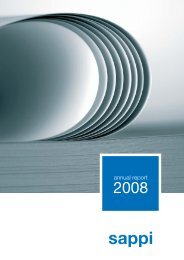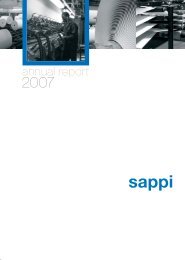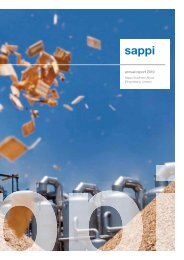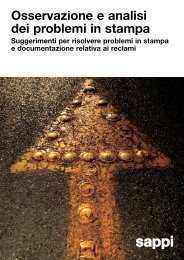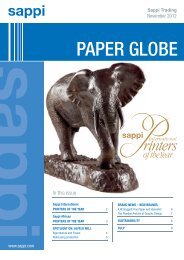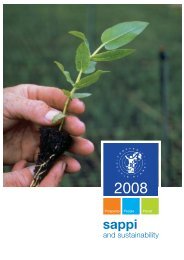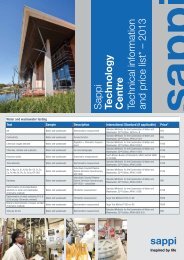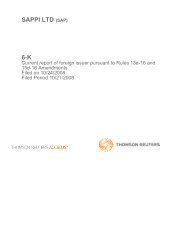2012 Integrated report - Sappi
2012 Integrated report - Sappi
2012 Integrated report - Sappi
You also want an ePaper? Increase the reach of your titles
YUMPU automatically turns print PDFs into web optimized ePapers that Google loves.
Governance and compensation continued<br />
Compensation <strong>report</strong> continued<br />
fund and the company’s contributions in total during <strong>2012</strong> was<br />
37.8% of base salary. This includes a contribution increase all<br />
pension fund members received so that the solvency status of the<br />
pension fund met the requirements of the South African Financial<br />
Services Board.<br />
No additional payments were made to any retirement funds<br />
on behalf of the executive directors.<br />
Short term incentive<br />
The annual management incentive scheme bonus is determined<br />
by the achievement of pre-determined targets. At the beginning of<br />
the financial year, the board approves a budget with financial<br />
targets for the group.<br />
Executive directors and other key senior managers participate in<br />
the annual management incentive scheme.<br />
Cash bonuses are earned based on achieving both the financial<br />
criteria targets for the business unit in which the individual is<br />
working (80%) and individual performance objectives (20%).<br />
The performance measures for the management incentive<br />
scheme for <strong>2012</strong> were Operating Profit (60%), Working Capital<br />
(30%) and Capital Expenditure (10%).<br />
A performance threshold of 75% of Operating Profit is required<br />
before a bonus can be paid.<br />
If the group or business unit did not achieve a minimum of 75% of<br />
the Operating Profit target for that year, no bonus is paid to the<br />
participants in either the group or business unit for that year.<br />
No bonus will be paid to participants in <strong>Sappi</strong> Fine Paper North<br />
America this year, as they did not meet the performance threshold.<br />
In exceptional circumstances, in recognition of new business<br />
goals or major unplanned events, the committee has the right to<br />
exercise its discretion in authorising adjustments to financial and<br />
individual performance targets, which it deems appropriate when<br />
evaluating performance against targets at financial year end.<br />
Group executive bonus payments for financial year <strong>2012</strong>, which<br />
will be paid in December <strong>2012</strong>, were calculated on the<br />
achievement of financial targets of 52.2% for the group.<br />
Weighting Target points<br />
<strong>2012</strong> Actual<br />
achievement<br />
Operating profit 60% 48 8.16<br />
Working capital 30% 24 36.00<br />
Capital expenditure 10% 8 8.00<br />
80 52.16<br />
In December <strong>2012</strong> it is estimated that Mr Boëttger will receive a<br />
bonus payout of US$483,471 (64% of base salary) and that<br />
Mr Binnie will receive a bonus payout of US$53,282 (15% of base<br />
salary). Mr Binnie was appointed in July <strong>2012</strong> and his bonus<br />
payout is pro-rated for the period he worked for the group.<br />
Mr Thompson, who was the CFO until the end of August <strong>2012</strong>,<br />
will receive an estimated bonus payout of US$228,274 (56% of his<br />
base salary). Mr Thompson’s bonus will be pro-rated for the<br />
11 months he worked in the <strong>2012</strong> financial year.<br />
The bonuses paid in December <strong>2012</strong> fall within the 2013 financial<br />
year and relates to performance in the <strong>2012</strong> financial year.<br />
Mr Boëttger has voluntarily offered to buy <strong>Sappi</strong> shares with 40%<br />
of his post-tax <strong>2012</strong> cash bonus and to hold these for a period of<br />
three years.<br />
In December 2011, which was in the <strong>2012</strong> financial year,<br />
Mr Boëttger received a bonus of US$669,438 and Mr Thompson<br />
received a bonus of US$288,872. These bonuses relate to<br />
performance in the 2011 financial year.<br />
Bonus award targets<br />
Target bonus<br />
as % of<br />
base salary<br />
Maximum<br />
bonus % of<br />
base salary<br />
that can<br />
be earned<br />
Group CEO 85 116<br />
Regional CEOs 70 95<br />
Executive management 65 88.5<br />
For 2013, a number of changes have been made to the annual<br />
management incentive scheme rules:<br />
> The general rules of the scheme have changed by replacing<br />
Capital Expenditure with Safety as a performance measure.<br />
Safety targets will be based on a rolling 12-month average<br />
performance of Lost-Time Injury Frequency Rates set to be in<br />
the upper quartile of the industry in which the business unit is<br />
located. If no industry benchmark exists, the target is set at<br />
equal or better than the average of the last three years.<br />
Should one or more fatalities occur within a region, the CEO of<br />
the group may recommend that the management incentive<br />
scheme of those accountable and responsible for Safety at a<br />
mill and/or region, be negatively impacted.<br />
The committee may exercise its discretion in line with the rules<br />
of the management incentive scheme and decide that the<br />
management incentive scheme award of the group CEO and<br />
anyone else who they deem responsible for a poor safety<br />
record, also be negatively impacted.<br />
88



